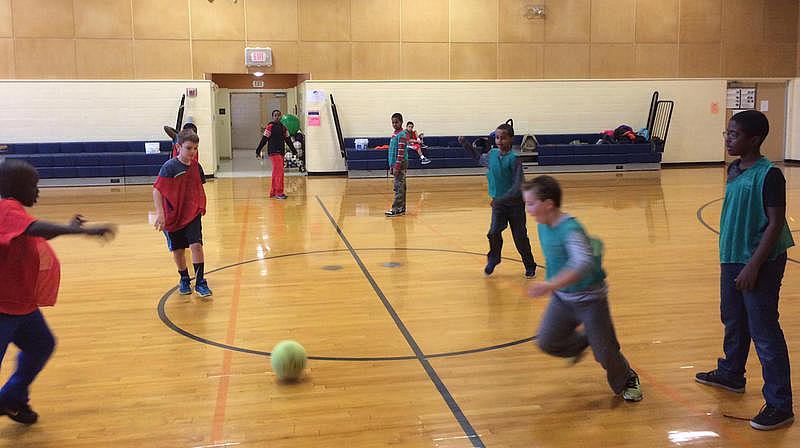Maine elementary school offers morning activities — before classes start
Patty Wight reported this story with the support of the Dennis A. Hunt Fund for Health Journalism and the National Health Journalism Fellowship, programs of USC Annenberg’s Center for Health Journalism.
Other stories in the series include:
For Maine families depending on SNAP for groceries, every penny counts

East End schoolkids play indoor soccer during Rise and Shine. Photo credit: Patty Wight/MPBN
It’s recommended that children get at least one hour of exercise a day. But in Maine, fewer than one in three kids reach that goal.
In the fourth part of our series exploring the link between childhood poverty and obesity, we visit an elementary school in Portland that has developed a creative way to get kids moving.
On any given morning, well before the bell rings at East End Community School, a line of kids forms outside.
P.E. teacher Marge Queen says the big draw is something called Rise and Shine. It’s a program for grades 3-5 which offers activities that range from healthy cooking classes and computer coding to skateboarding — all before school.
“Today our health and wellness offerings are indoor soccer, kick ball, and hip-hop,” Queen says.
Within minutes of the school doors opening, 16 kids are in the gym, ready for indoor soccer. Queen lays out her expectations for the game.
“You working hard, you passing for a purpose,” she says. “You shooting on goal, and you working together and hard as a team. Those are things I’m looking for, and out of it that you get a great physical activity workout.”
Before Rise and Shine started 5 years ago, East End Community School had a lot of attendance and behavior problems. There’s a high poverty rate at the school. Students would come for free breakfast, says Queen, and devour their meals.
“There would be a 20 or 25 minute hold in cafeteria,” she says. “And I think everybody knows what happens when kids don’t have a whole lot to do.”
“I had so much energy I just couldn’t keep it in,” says Ronan Mas, a third grader who’s playing indoor soccer.
He says before Rise and Shine, it was tough to come to school and immediately get to work in the classroom.
“So I took it all out at school, and it got me in lots of trouble,” Ronan says. “But now that R&S started, it’s going really well for me.”
The state of Maine requires kids to meet certain physical education standards, but there’s no minimum time requirement for a P.E. class itself. There’s also no requirement that schools offer recess.
At East End, kids get a half an hour of recess every day. P.E. class is once a week, for 45 minutes. But Queen says it’s not enough.
“Well if you look at obesity rates across nation — that 1 hour of physical activity a day, students aren’t getting it,” she says.
But Rise and Shine offers up a potential extra 30 minutes a day. Not only does it reinforce healthy physical habits, says math specialist Joshua Chard, it creates a better school culture.
“It sounds hokey, but the truth is, a student coming up stairs with smile on their face instead of scowl because they spent their morning engaging in a physical activity and their body is pumped full of positive endorphins,” he says, “really sets them up ready to do excellent work in their classroom.”
Even though Rise and Shine is optional, 95 percent of kids show up early to school to take part. It has essentially become a part of the school day. East End even changed its bus schedule to ensure that all kids could get to Rise and Shine.
At a hip-hop class, third grader Baleria Kidenyugu practices dance moves like the whip. She says she just doesn’t feel good if she doesn’t move in the morning.
“Going straight to the classroom, it wouldn’t feel right for me,” she says. “I’m an active person, really. I like to do a lot of sports and do a lot of stuff.”
Getting Rise and Shine to where it is today was logistically challenging, says Chard. Teachers dedicate their time to lead activities. The school finagles the schedule to ensure each student can participate in their top choices. And there’s that bus schedule change.
But, says Chard, it shouldn’t discourage other schools from trying something similar.
“Don’t start by looking at where we are now,” she says. “Start by looking at where we started, which was really understanding and getting to know our students — and getting to know their needs, and also their wants. So start there. And maybe you can start small. Maybe you can start with one day a week.”
Any opportunity, says Queen, to help increase physical activity is worth it.
“If we can create a lifelong love of physical activity, I think what we would see is happier, healthy children,” she says.
[This story was originally published by Maine Public Broadcasting Network.]
Photo by Patty Wight/Maine Public Broadcasting Network.

